比较教育理论与方法课程纲要
什么是《课程纲要》

什么是《课程纲要》实践与理论都表明,教师从写“教案”、“教学进度表”到撰写“课程纲要”是提高教师课程能力的一种重要途径。
我校为谋求有效地促进教师形成课程意识,提高课程能力,基于九年一贯的课程规划,组织与培训教师撰写《课程纲要》,并达到了预期的效果。
一、《课程纲要》及其意义,一,何为《课程纲要》,《课程纲要》是指以纲要的形式呈现某门课程的各种课程元素。
从广义来说,大到国家课程方案,小到教师写的教案或活动计划,都是课程纲要。
狭义来讲,课程纲要是包含各种课程元素的某门学程的大纲或计划书。
这里,主要取其狭义,是指教师依据课程标准或指南和相关教材撰写的某学期某门课程(包括校本课程)的纲要。
《课程纲要》与教案、教学进度表的主要区别在于前者完整地体现了课程元素——课程目标、课程内容、课程实施与课程评价。
教案往往着重关注内容与方法,教学进度表主要包括教学时间与内容安排,都没有完整地体现课程的基本元素。
我们要求每位教师在新学期开学前一周必须上交一份任教学科在本学期的《课程纲要》,并在教研组内进行交流、分享与同行评议。
在新学期的第一次上课时,与学生分享《课程纲要》,让学生知道本学期本学科的课程教学计划。
,二,《课程纲要》的意义教师撰写《课程纲要》,必须考虑到课程的目标、相应的课时、学生背景分析、课程组织、实施的条件、学生评价以及各方面的总体协调等情况。
正因为《课程纲要》的撰写要涉及到这些方面,因此《课程纲要》的撰写对教师、学生以及学校而言就有多重意义。
1.有利于教师整体把握实施的课程目标与内容教师撰写《课程纲要》实际上也就是对将要实施的教学进行了整体设计。
实践中,教师常常会犯这样一种错误,那就是非常清楚每个章节的知识点,但也往往忽略了各章节之间的逻辑关系及课程的目标,从而失去了对任教学科的总体把握。
这种“只见树木,不见森林”的现象易使教师忽略了学科的本质特征和目的所在。
在撰写本学期的课程纲要时,教师必须厘清本学期的课程在本课程中的地位与价值,明确本学期的课程内容与课程整体的逻辑关系,明确知识点与课程目标之间的逻辑关系,因此有利于教师把握课程的整体。
高等教育学课程大纲
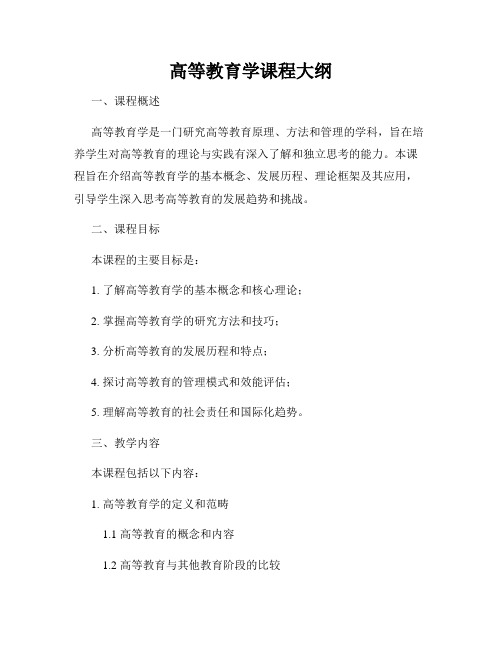
高等教育学课程大纲一、课程概述高等教育学是一门研究高等教育原理、方法和管理的学科,旨在培养学生对高等教育的理论与实践有深入了解和独立思考的能力。
本课程旨在介绍高等教育学的基本概念、发展历程、理论框架及其应用,引导学生深入思考高等教育的发展趋势和挑战。
二、课程目标本课程的主要目标是:1. 了解高等教育学的基本概念和核心理论;2. 掌握高等教育学的研究方法和技巧;3. 分析高等教育的发展历程和特点;4. 探讨高等教育的管理模式和效能评估;5. 理解高等教育的社会责任和国际化趋势。
三、教学内容本课程包括以下内容:1. 高等教育学的定义和范畴1.1 高等教育的概念和内容1.2 高等教育与其他教育阶段的比较2. 高等教育学的发展历程2.1 高等教育的起源与演变2.2 世界各国高等教育发展的比较3. 高等教育学的理论框架与方法3.1 教育学理论在高等教育中的应用3.2 社会科学方法在高等教育研究中的运用4. 高等教育的组织与管理4.1 高等教育机构的类型与管理模式4.2 高等教育的质量保障体系与效能评估5. 高等教育的发展趋势和挑战5.1 科技进步对高等教育的影响5.2 全球化背景下的高等教育发展5.3 高等教育的社会责任与可持续发展四、教学方法本课程采用多种教学方法,包括课堂讲授、讨论、案例分析、小组合作学习等。
学生将通过自主学习和团队合作,培养批判性思维和问题解决能力。
五、教材与参考资料1. 主教材:- 高等教育学导论,作者:X,出版社:XX出版社,年份:20XX - 高等教育学原理与方法,作者:XX,出版社:XX出版社,年份:20XX2. 拓展阅读:- 高等教育学研究方法,作者:XX,出版社:XX出版社,年份:20XX- 高等教育管理与改革,作者:XX,出版社:XX出版社,年份:20XX六、评估与考核1. 平时表现:包括课堂参与、小组讨论等(占比30%)2. 作业:包括课后习题、案例分析等(占比30%)3. 期中考试:闭卷考试,考察对课程基本内容的掌握(占比20%)4. 期末论文:独立完成课程相关主题的论文(占比20%)七、参考性课程安排本课程的教学进度和具体安排将根据实际情况确定。
有关课程纲要的书籍
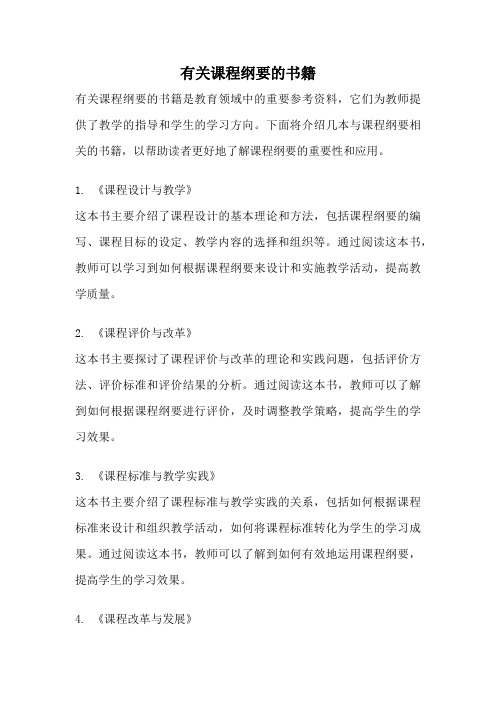
有关课程纲要的书籍有关课程纲要的书籍是教育领域中的重要参考资料,它们为教师提供了教学的指导和学生的学习方向。
下面将介绍几本与课程纲要相关的书籍,以帮助读者更好地了解课程纲要的重要性和应用。
1. 《课程设计与教学》这本书主要介绍了课程设计的基本理论和方法,包括课程纲要的编写、课程目标的设定、教学内容的选择和组织等。
通过阅读这本书,教师可以学习到如何根据课程纲要来设计和实施教学活动,提高教学质量。
2. 《课程评价与改革》这本书主要探讨了课程评价与改革的理论和实践问题,包括评价方法、评价标准和评价结果的分析。
通过阅读这本书,教师可以了解到如何根据课程纲要进行评价,及时调整教学策略,提高学生的学习效果。
3. 《课程标准与教学实践》这本书主要介绍了课程标准与教学实践的关系,包括如何根据课程标准来设计和组织教学活动,如何将课程标准转化为学生的学习成果。
通过阅读这本书,教师可以了解到如何有效地运用课程纲要,提高学生的学习效果。
4. 《课程改革与发展》这本书主要探讨了课程改革与发展的理论和实践问题,包括课程改革的动因、目标和策略等。
通过阅读这本书,教师可以了解到课程纲要的历史演变和未来发展趋势,为自己的教学实践提供参考。
5. 《课程管理与领导力》这本书主要介绍了课程管理和领导力的理论和实践问题,包括如何制定课程管理计划、如何培养教师的领导力等。
通过阅读这本书,教师可以了解到如何有效地管理和领导课程,提高教学质量。
总结起来,以上这些书籍都是与课程纲要相关的重要参考资料,它们可以帮助教师更好地理解和应用课程纲要,提高教学质量和学生的学习效果。
通过阅读这些书籍,教师可以了解到课程纲要的编写、评价和改革等方面的知识,提升自己的教学能力和素养。
因此,教育工作者在教学实践中应当重视这些书籍的阅读和研究,不断提高自身的教学水平。
比较教育课程教学大纲

比较教育课程教学大纲泰山=学院课程教学大纲(理论课或含实验课程)课程名称:比较教育 _____________________适用专业:小学教育专升本专业_________________ 课程类别:专业主干 __________________制订时间:2011 年8月教师教育学院制比较教育课程教学大纲(2006年制订,2011年修订)一、课程概述:比较教育是一门面向高等学校教育类专业学生的必修课程。
它以比较法为主要的研究方法,通过对当代世界各国教育发展的一般规律和特殊规律的研究,揭示出教育发展的主要因素及其相互关系,并探索未来教育的发展趋势,以为本国教育的改革与发展提供启示与借鉴。
比较教育研究从类别上可分为:区域研究和问题研究。
本课程属于问题研究,主要对当代发达国家美、英、日等国的教育制度、教师教育、道德教育以及课程教学等问题进行比较研究。
二、教学目的:他山之石,可以攻玉。
通过对主要发达国家美、英、日等国的教育制度、教师教育、道德教育以及课程教学等问题的比较研究,来加深对我国相关问题的理解和认识,并为我国学校教育管理的改革、师资培养模式的改革以及学校道德教育、课程教学等问题的改革提供有益的启示与借鉴。
三、学时分配表(4号宋体加粗)四、教学基本内容:第一章绪论【目的要求】1掌握比较教育的定义,比较教育的学科特点以及学习方法。
2•熟悉比较教育在其发展中形成的各种比较研究的方法。
3•了解学习比较教育的意义以及其发展的历史。
【主要内容】1比较教育的定义2•比较教育的学科特点3•学习比较教育的意义4、学习比较教育的方法5、比较教育研究的常用方法第二章教育制度的比较【目的要求】1 •掌握美、英、日三国学制改革和教育行政体制改革的趋势,并在此基础上思考我国学制和教育行政体制改革与发展的方向。
2 •熟悉美、英、日等发达国家学校教育制度和教育行政体制的构造及其特点3•了解更多国家的教育制度,包括发展中国家。
【主要内容】1•美国教育制度2•英国教育制度3.0本教育制度4.美英日三国教育制度的比较5.我国学制和教育行政体制改革与发展的方向第三章教师教育的比较【目的要求】1.掌握美、英、日三国教师培养的模式、教师职前教育的课程、实习以及出任教师进修、在职教育的过程和特点。
比较教育期末总结

比较教育期末总结第一章:教育的目标与意义一、教育的目标1. 培养人的全面发展2. 培养公民素质3. 培养人的创新能力4. 促进社会的持续发展二、教育的意义1. 促进社会进步与发展2. 增强个人能力和竞争力3. 培养公民责任感4. 塑造社会价值观第二章:教育的基本原则一、以人为本的原则1. 尊重个体差异2. 关注个体需求3. 调动个体潜能二、因材施教的原则1. 个性化教育2. 引导学生发展潜能3. 差异化教学三、全面发展的原则1. 德智体美劳全面发展2. 综合素质教育3. 教育公平与平等第三章:教育的改革与创新一、教育改革的目标与方向1. 促进教育公平与平等2. 强调素质教育3. 推动教育信息化4. 培养创新能力和实践能力二、教育创新的方法与途径1. 教育技术的应用2. 课程体系的改革3. 教育管理的创新4. 教学方法的创新第四章:教育的挑战与应对一、社会变革对教育的挑战1. 信息技术的快速发展2. 劳动力市场的变化3. 人口老龄化与家庭结构的调整二、应对教育挑战的策略1. 建立现代化教育体系2. 加强教师培训与发展3. 推动教育与产业融合4. 健全教育评价体系第五章:教育的展望与建议一、教育的未来发展趋势1. 个性化教育的深入发展2. 教育资源的共享与开放3. 创新教育的兴起4. 建立全球化教育网络二、教育的未来建议1. 推动教育公平与平等2. 培养学生创新能力和实践能力3. 引导学生树立正确的价值观4. 建立教育与产业的紧密联系结语:教育是一项充满希望和挑战的事业,我们需要不断地改革创新,以适应社会的变化和发展。
通过教育,我们可以培养每个人的全面素质,促进社会的进步与发展。
希望未来的教育能够更加关注学生的需求和个性发展,真正实现个性化、全面发展的教育目标。
课程与教学——精选推荐

第五章课程理论第一节课程与课程理论一、课程的含义“课程”,一词,常指功课及进程。
最早采用“课程”一词的是英国著名的教育家斯宾塞。
(一)课程即教学科目缺点:把课程里结成教学科目会造成学生的心智发展、情感陶冶和创造性表现等方面的发展。
我国现在课程改革已经将综合实践课作为课程的一部分。
(二)课程即学习经验美国教育家杜威的实用主义经验论:课程就是学生的学习经验(三)课程即文化再生产鲍尔斯和金迪斯是这一主张的重要代表人物(四)课程即社会改造过程代表人物是巴西的费雷尔认为课程的重点应放在当代社会的主要问题和主要弊端、学生关心的社会现象以及改造社会和社会活动规划等方面。
课程是一个发展的概念,它是为实现各级各类学校的教育目标而规定的教学科目及它的目的、内容、范围、分量和进程的总和,包括为学生个性的全面发展而营造的学校环境的全部内容。
二、课程理论流派课程论是根据对学科系统、个性心理特征、社会需要的不同认识和价值取向而建立起来的关于课程编定的理论和方法体系。
对课程产生影响的三个因素:学科的逻辑、学生的心理发展逻辑、社会的要求。
或不同的课程流派。
(一)学科中心主义课程论学科中心主义课程论主张学校课程应以学科的分类为基础,以学科教学为核心,以掌握学科的基本知识、基本规律和相应的技能为目标。
1、斯宾塞《什么知识最有价值》(1859)主张依据人类生活的五种主要活动组织课程。
2、赫尔巴特认为编制课程应以人类“客观的文化遗产”——科学为基础,以发展人的“多方面的兴趣”为轴心,设臵相应的学科。
认为人的兴趣主要有六个方面,由此开设六类课程。
经验兴趣(自然、物理、化学、地理),思辨兴趣(数学、逻辑学、文法学),审美兴趣(文学、绘画、音乐),同情兴趣(语言课程),社会兴趣(公民、历史、政治、法律),宗教兴趣(神学课程)3、30年代美国要素主义对进步主义(19世纪末、20世纪初,美国教育思潮,代表人物有杜威,源于卢梭、裴斯泰洛齐、福禄倍尔)的儿童经验论持批判态度。
中小学教师科研选题的六大途径

师的专业发展 , 就可写 出《 以人类发展生 态学的视 角看 小 学教 师专业发展》 等文章。
一
期 。 往往能找到该期刊 20 度选题指南。 也 0 9年
l
为 了更好地指导教育科学研究工作 ,提高教育科学
杜威曾 :无论哪门学科的方法、 说 “ 事实和原则 , 只要 I 研究水平及其成效,国家及地方的教育行政部门及学术 能使我学研究的发展作出规
师最重要也最常用的选 题方法 。
二 、 文献 资 料 分 析 中选 题 从
实践经验 的概括总结或教育理论本身 的推理建构而形成 J 的。教师们可从某个教育理论观点 中使用演绎 的推理方 -
某位教 师查 阅了 自实施 义务教 育以来 ,我 国大 陆地 l 法导出一些合乎逻辑的研究课题 ,也 可选择教育理论有 针对性地运用于实践 ,通过 实践结果验证和发展教育理 区颁布的“ 教学 大纲” 课程标 准” 台湾省颁布的 “ “ 和 课程 {
策略研究 、 中学数学教学 中师生互动的策略研究 、 小学语 , 教 师 工作 满 意度 的关 系研 究》 … 和 …
文教学方法中的朗读法研究 、 纠正高三学生厌学情绪的 J 如今 , 国内外教 育理论十分 丰富 , 教学理论 、 如 课程 策略研究、 中学差生学习障碍研究等, 这是广大中小学教 l 理论 、 习理论 、 学 德育理论 等 , 这些 都是经过前人对教 育
《 教学 与管 理 》
20 0 9年 8月 1日
中小学教师科研选题的
⑩西 南大学教育学院
尹 国强 杨 晓萍
“ 搞科研 ” 写论文” “ 是令许多教师 头痛的问题 , 甚至 f 标准”课 程纲要 ” 并对其进行分析 比较 , 出了《 国大 “ , 得 我
校本课程纲要

《校本课程纲要》撰写的一般模式《校本课程纲要》是教师层面上的具体的校本课程开发方案。
设计《校本课程纲要》是教师开发校本课程的主要方面,是校本课程实施和评价的主要依据。
一般情况下,由教师设计的《校本课程纲要》通过学校课程委员会初审后,主可以列入校本课程选修目录单中,供学生选择。
因此,设计《校本课程纲要》的技术很重要。
《校本课程纲要》一般应包括一般项目和具体内容两大部分。
一、一般项目1、课程标题2、主讲教师3、教学材料(改编、创编、选编)4、课程类型5、授课时间6、授课对象例如:《国际音标巧入门》校本课程纲要一、基本项目课程标题: 《国际音标巧入门》主讲教师:汪静艳教学材料:自编课程类型:学科拓展类授课时间:一学期(每周一节)授课对象:三年级学生二、具体内容1、课程目标课程目标决定课程的性质。
课程目标一旦确定,课程内容、课程实施和课程评价就有了依据。
在确定课程目标时,校本课程开发者必须认真、全面地考虑特定的学生群体在未来社会中的社会角色和发展方向,并明确回答下列问题:这一特定的学生群体究竟需要哪种课程?对这个问题作出圆满回答后,才能开始确定课程目标。
目标是有层次的,通常依次分解为教育目的、教育目标、课程目标和教学目标。
教育目的、教育目标和课程目标是比较笼统的、宽泛的目标,教学目标是具体的、细化的目标。
它们还可以继续分解成若干层次,如单元目标和课程目标。
一般而言,校本课程开发者对有关社会、学生和知识的信息掌握的越全面,教育目标就越全面、越恰当、越细化。
要求:全面、适当、清晰例如:《定向越野》校本课程纲要二、课程目标以《全民健身计划实施纲要》为指导,以全面贯彻落实课改精神为宗旨,以开展定向越野为契机,在对学生进行国防教育的同时普及与提高定向越野,全面推进素质教育,为申报定向越野特色学校奠定基础。
1.通过教学,让学生了解定向越野的概况、基本技术、技能;2.通过教学,增强学生体质、体能;3.通过教学,培养学生发现问题、解决问题等自主学习的能力;4.通过教学,增强学生国防意识,培养学生团队精神;5.通过教学,普及和提高、稳固和提升我校定向越野项目在市、区初中校中的优势地位。
幼儿园教案重点难点
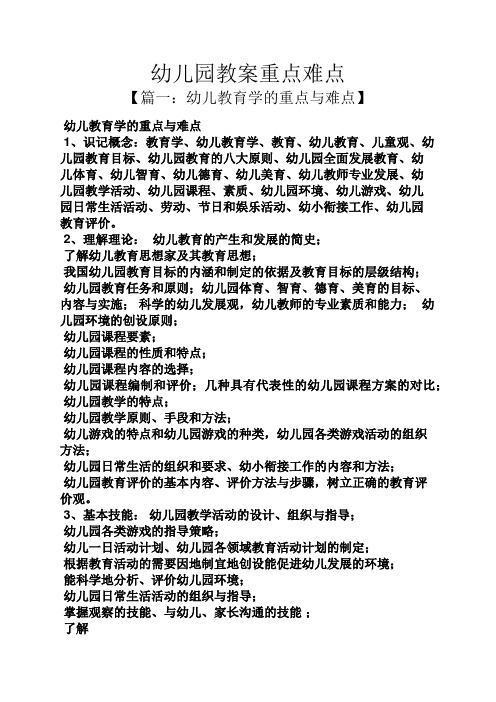
幼儿园教案重点难点【篇一:幼儿教育学的重点与难点】幼儿教育学的重点与难点1、识记概念:教育学、幼儿教育学、教育、幼儿教育、儿童观、幼儿园教育目标、幼儿园教育的八大原则、幼儿园全面发展教育、幼儿体育、幼儿智育、幼儿德育、幼儿美育、幼儿教师专业发展、幼儿园教学活动、幼儿园课程、素质、幼儿园环境、幼儿游戏、幼儿园日常生活活动、劳动、节日和娱乐活动、幼小衔接工作、幼儿园教育评价。
2、理解理论:幼儿教育的产生和发展的简史;了解幼儿教育思想家及其教育思想;我国幼儿园教育目标的内涵和制定的依据及教育目标的层级结构;幼儿园教育任务和原则;幼儿园体育、智育、德育、美育的目标、内容与实施;科学的幼儿发展观,幼儿教师的专业素质和能力;幼儿园环境的创设原则;幼儿园课程要素;幼儿园课程的性质和特点;幼儿园课程内容的选择;幼儿园课程编制和评价;几种具有代表性的幼儿园课程方案的对比;幼儿园教学的特点;幼儿园教学原则、手段和方法;幼儿游戏的特点和幼儿园游戏的种类,幼儿园各类游戏活动的组织方法;幼儿园日常生活的组织和要求、幼小衔接工作的内容和方法;幼儿园教育评价的基本内容、评价方法与步骤,树立正确的教育评价观。
3、基本技能:幼儿园教学活动的设计、组织与指导;幼儿园各类游戏的指导策略;幼儿一日活动计划、幼儿园各领域教育活动计划的制定;根据教育活动的需要因地制宜地创设能促进幼儿发展的环境;能科学地分析、评价幼儿园环境;幼儿园日常生活活动的组织与指导;掌握观察的技能、与幼儿、家长沟通的技能;了解幼儿园各类活动(游艺活动、娱乐活动、庆祝活动、毕业典礼等)的设计与组织;根据幼儿发展的水平合理设计和组织幼儿的入学准备活动。
4、综合应用:能将幼儿园教育目标层层分解为班级逐年具体的教育活动目标;能根据幼儿园教育目标和幼儿发展的特点制订班级各类教育计划和课程计划;能综合运用各种教育和教学原则、幼儿全面发展的观点分析评价幼儿园教育工作;能选择恰当的教学活动组织形式、指导方式和教学方法,设计和组织符合幼儿发展特点的教学活动;根据幼儿兴趣提供幼儿自选游戏和自由自发游戏的材料和环境,学会观察并能运用游戏理论分析幼儿园游戏对儿童的各方面的影响;能科学的分析和评价幼儿园教学、幼儿园游戏等各种教育教学活动及一日生活的各环节活动;能科学分析和评价幼儿发展、幼儿教育实践中教师的具体行为、当今幼儿教育的现状与问题。
比较教育,讲义 第四章
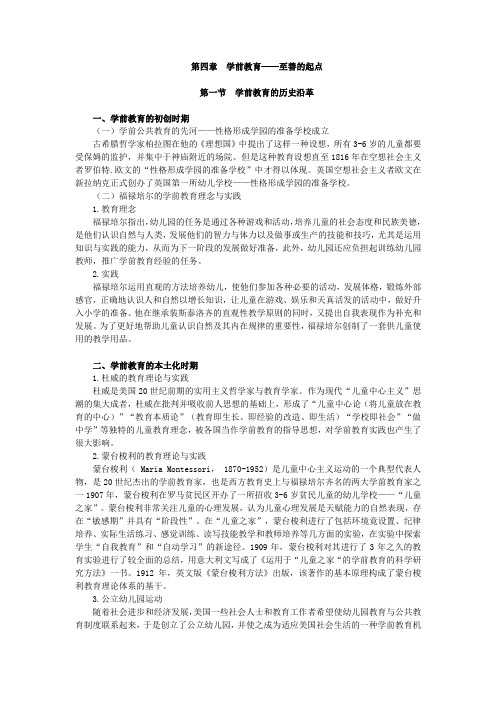
第四章学前教育——至善的起点第一节学前教育的历史沿革一、学前教育的初创时期(一)学前公共教育的先河——性格形成学园的准备学校成立古希腊哲学家柏拉图在他的《理想国》中提出了这样一种设想,所有3-6岁的儿童都要受保姆的监护,并集中于神庙附近的场院。
但是这种教育设想直至1816年在空想社会主义者罗伯特.欧文的“性格形成学园的准备学校”中才得以体现。
英国空想社会主义者欧文在新拉纳克正式创办了英国第一所幼儿学校——性格形成学园的准备学校。
(二)福禄培尔的学前教育理念与实践1.教育理念福禄培尔指出,幼儿园的任务是通过各种游戏和活动,培养儿童的社会态度和民族美德,是他们认识自然与人类,发展他们的智力与体力以及做事或生产的技能和技巧,尤其是运用知识与实践的能力,从而为下一阶段的发展做好准备,此外,幼儿园还应负担起训练幼儿园教师,推广学前教育经验的任务。
2.实践福禄培尔运用直观的方法培养幼儿,使他们参加各种必要的活动,发展体格,锻炼外部感官,正确地认识人和自然以增长知识,让儿童在游戏、娱乐和天真活发的活动中,做好升入小学的准备。
他在继承装斯泰洛齐的直观性教学原则的同时,又提出自我表现作为补充和发展。
为了更好地帮助儿童认识自然及其内在规律的重要性,福禄培尔创制了一套供儿童使用的教学用品。
二、学前教育的本土化时期1.杜威的教育理论与实践杜威是美国20世纪前期的实用主义哲学家与教育学家。
作为现代“儿童中心主义”思潮的集大成者,杜威在批判并吸收前人思想的基础上,形成了“儿童中心论(将儿童放在教育的中心)”“教育本质论”(教育即生长、即经验的改造、即生活)“学校即社会”“做中学”等独特的儿童教育理念,被各国当作学前教育的指导思想,对学前教育实践也产生了很大影响。
2.蒙台梭利的教育理论与实践蒙台梭利( Maria Montessori, 1870-1952)是儿童中心主义运动的一个典型代表人物,是20世纪杰出的学前教育家,也是西方教育史上与福禄培尔齐名的两大学前教育家之一1907年,蒙台梭利在罗马贫民区开办了一所招收3-6岁贫民儿童的幼儿学校——“儿童之家”。
小学科学教科版课程纲要
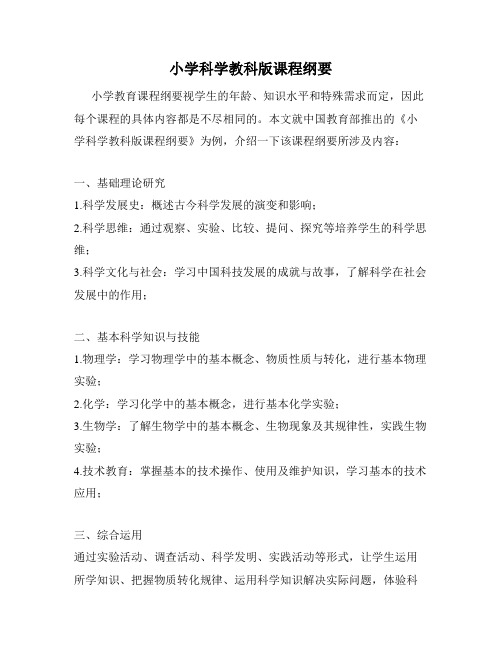
小学科学教科版课程纲要
小学教育课程纲要视学生的年龄、知识水平和特殊需求而定,因此每个课程的具体内容都是不尽相同的。
本文就中国教育部推出的《小学科学教科版课程纲要》为例,介绍一下该课程纲要所涉及内容:
一、基础理论研究
1.科学发展史:概述古今科学发展的演变和影响;
2.科学思维:通过观察、实验、比较、提问、探究等培养学生的科学思维;
3.科学文化与社会:学习中国科技发展的成就与故事,了解科学在社会发展中的作用;
二、基本科学知识与技能
1.物理学:学习物理学中的基本概念、物质性质与转化,进行基本物理实验;
2.化学:学习化学中的基本概念,进行基本化学实验;
3.生物学:了解生物学中的基本概念、生物现象及其规律性,实践生物实验;
4.技术教育:掌握基本的技术操作、使用及维护知识,学习基本的技术应用;
三、综合运用
通过实验活动、调查活动、科学发明、实践活动等形式,让学生运用所学知识、把握物质转化规律、运用科学知识解决实际问题,体验科
学技术的博大精深与发展乐趣,切实提升学生学习创新的能力,培养新世纪的科学家和创新人才。
本课程纲要的目的在于,为学生提供更多的学习机会,让学生们更好地体验科学,更好地了解现代科学发展,培养他们的实际操作能力优先于理论,以期促进学生的学习兴趣,提高学习水平。
课程概述

各位评委老师,上午好,我叫冯曼君,是第()号考生,来自西南科技大学。
今天我说课的题目是《课程概述》。
下面从教材分析,教法与学法,课堂设计,板书,四方面逐一加以分析和说明。
(一)教材分析:(1)教材的地位和作用出自华东师范大学出版社出版的《教育学》(第二版)这本教材是一部教育学的高等教材,它在讨论教育的本质功能时,辩证地论述了教育的社会功能与育人功能之间,人的发展与社会发展之间的辩证统一关系,把教育要满足社会发展的需要与满足人的发展的需要协调统一起来。
该教材针对教育理论和教育实践之间的教育行动理论相对贫乏这一事实,在编写过程中就十分重视加强这类类容。
本节课位于教材的第六章第一节。
它是属于教育学中有关教学活动中的基础性知识,目的为了让学生对学校教学有一个系统科学的认识。
以便学生更加理性地客观地看待事物。
(2)教学目标知识目标:理解课程的含义,对学校课程设置有个系统的了解。
能力目标:通过讲解和相关资料演示培养学生对知识的理解能力和转化吸收能力,从看二维的课本文字表述上升到构建三维的立体知识框架。
情感目标:培养学生善于留心观察,认真细致的学习态度。
创设问题情景,激发学生观察分析探求的学习激情,强化学生参与意识。
在自主探究与讨论交流中,培养学生的合作意识和创新精神。
(3)教学重点难点教学重点:掌握课程的基本类型。
教学难点:理解划分课程类型的依据。
区分核心课程与经验课程。
(二)说教法学法再说教法学法之前先来对高中生这个群体进行分析:高中生处于学龄晚期,他们的认知发展已经比较成熟,在教学中运用学生的认知特点来指导教学,将会使他们能更好的掌握知识规律,高中生个体的自觉性和独立性有了显著的增长,所以在课堂上教师不必花太多时间来注意课堂纪律和指导学生怎样学习,直接通过引出重点知识进行讲解让学生自己主动地在头脑中构建知识结构。
最终达到自学的能力,为他们进入大学学习打下基础。
那么针对以上分析来谈一下教法和学法:(1)教法:本节课设计的指导思想是:认知心理学建构主义学习理论。
鲁教版化学学科九年级上学期《课程纲要》

课程内容
实施内容
课时安排
第一单元 步入化学殿堂
8课时左右
第二单元 探秘水世界
10课时左右
第三单元 溶液
7课时左右
第四单元 我们周围的空气
11课时左右
第五单元 定量研究化学
9课时左右
第六单元 燃料与燃烧
9课时左右
课程实施
(一)教学方式
充分利用班班通资源,采用直观演示、 启发讲解、师生互动交流,讲练结合,化学实验与课堂教学相结合等方式进行教学。
(二)学习方式
利用导学案和化学助学, 通过自主预习、小组交流、班级展示,运用操作等学习方式进行学习。
(三)实施对策
1、重视基本概念的教学:要尽可能做到通俗易懂,通过对实验现象和事实的分析、比较、抽象:概括,使学生形成概念。
3、学生书写错题分析报告,做好错题记录。
4、收集的有关资料,合作完成一次实践活动,撰写活动报告或小论文,
5、单元学习进行复习整理,及时互评。
(二)学生的基础知识和基本技能评价
1、卷面测试: 四十五分钟做完一套标准50分的化学试卷,要求选择错误率在20%以内,总卷面错误率达到30%以内为合格。
2、每一单元进行一次化学基础知识竞赛,主要考察基础知识和基本技能的掌握情况。
3、每周进行一次作业展览,对作业错误率加以控制。
4、学生自评和互评和教师、家长的评价相结合,给每位学生做出综合评定,评价方式应当多种多样。
(三)教师教学行为评价
1、通过学校救研组听评课活动对教师的教学活动进行打分评析。
2、通过学生的评教活动评定教师的教学行为。
3.依据学生成绩评估教师教学效果。
《比较教育的理论与方法》课程大纲(硕士研究生)

《比较教育的理论与方法》课程大纲(硕士研究生)课程名称:比较教育的理论与方法主讲教师:赵中建联系方式:***************,62232029 (O)(注:与教师个别交谈时间为每次上课前1个小时;其余时间请事先联系。
)专业方向:比较教育学(硕士生必修课程)课程目的:旨在让学习者通过本课程的学习,了解比较教育的学科历史发展、代表人物及其基本主张;熟悉比较教育的基本理论和比较教育研究的各种方法,了解比较教育研究的关注主题;掌握从事比较教育研究的基本手段和方法。
课时安排:共60课时(每周3课时,讨论或辅导另设3讲;修完本课程且成绩合格者,可获得3学分)。
课程内容安排:第一讲导论比较教育概论比较教育学科的性质,比较教育的对象,比较教育的领域,比较的单元,比较的性质与类别,静态与动态,知识与行动,方法与技术,研究的阶段等。
第二讲比较教育的发展历程国外比较教育发展的3个阶段:19世纪,学科倡导阶段;20世纪上半叶,学科形成阶段;20世纪50年代以来,学科蓬勃发展阶段。
中国比较教育发展的3个阶段:19世纪40年代到19世纪末,起步阶段;20世纪上半叶,学科独立阶段;新中国建立以来,逐步发展阶段。
第三讲比较教育的目的四种目的:1、增进对本国教育的理解;2、为本国教育的发展和改革作出贡献;3、有助于总结教育的规律或原则;4、有助于国际间的相互理解或友好。
反思:这些目的为谁考虑?第四讲比较教育研究的四种模式1、普遍主义的比较教育研究;2、民族主义的比较教育研究;3、国际主义的比较教育研究;4、全球主义的比较教育研究。
第五讲比较教育研究方法的主要流派(1)萨德勒、康德尔、汉斯等代表人物的比较教育观点(以因素分析为主)第六讲比较教育研究方法的主要流派(2)贝雷迪的比较四步法、诺亚和埃克斯坦的科学与量化方法、霍姆斯的问题研究法第七讲比较教育研究方法的主要流派(3)1、比较教育的哲学法;2、比较教育研究中的教育社会学;3、比较教育研究的文化主义方法第八讲比较教育中的意识形态问题(1)1、福斯特与卡诺伊等人之间的论争;2、阿切尔与埃德蒙.金之间的论争;3、比较教育中的实证主义。
有关教育的文献
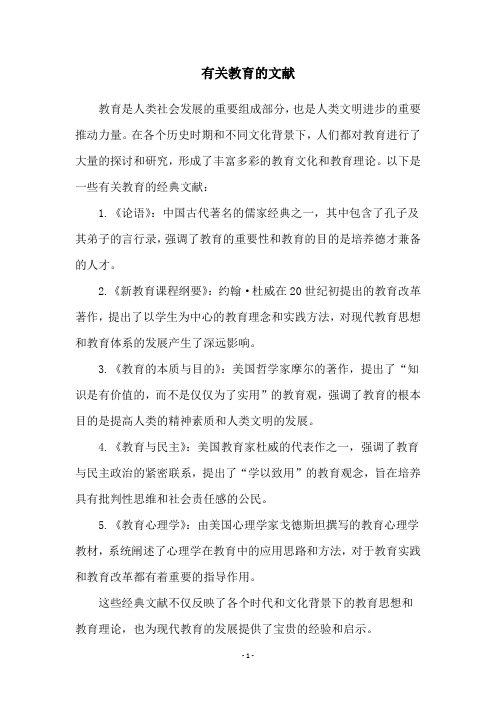
有关教育的文献
教育是人类社会发展的重要组成部分,也是人类文明进步的重要推动力量。
在各个历史时期和不同文化背景下,人们都对教育进行了大量的探讨和研究,形成了丰富多彩的教育文化和教育理论。
以下是一些有关教育的经典文献:
1.《论语》:中国古代著名的儒家经典之一,其中包含了孔子及其弟子的言行录,强调了教育的重要性和教育的目的是培养德才兼备的人才。
2.《新教育课程纲要》:约翰·杜威在20世纪初提出的教育改革著作,提出了以学生为中心的教育理念和实践方法,对现代教育思想和教育体系的发展产生了深远影响。
3.《教育的本质与目的》:美国哲学家摩尔的著作,提出了“知识是有价值的,而不是仅仅为了实用”的教育观,强调了教育的根本目的是提高人类的精神素质和人类文明的发展。
4.《教育与民主》:美国教育家杜威的代表作之一,强调了教育与民主政治的紧密联系,提出了“学以致用”的教育观念,旨在培养具有批判性思维和社会责任感的公民。
5.《教育心理学》:由美国心理学家戈德斯坦撰写的教育心理学教材,系统阐述了心理学在教育中的应用思路和方法,对于教育实践和教育改革都有着重要的指导作用。
这些经典文献不仅反映了各个时代和文化背景下的教育思想和教育理论,也为现代教育的发展提供了宝贵的经验和启示。
比较较教育学 教学大纲
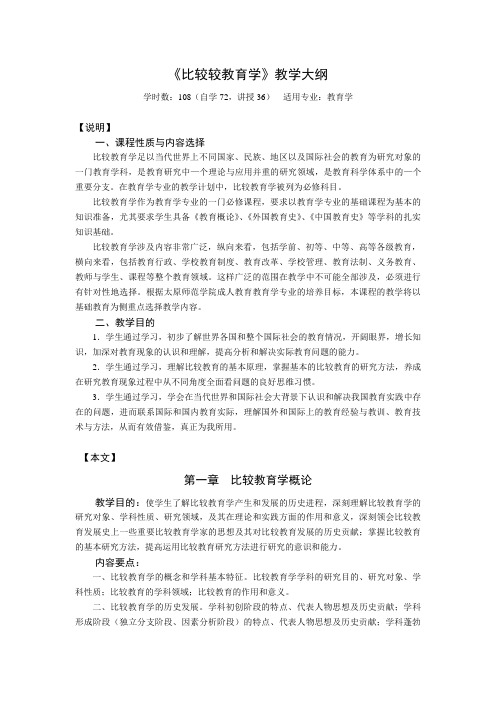
《比较较教育学》教学大纲学时数:108(自学72,讲授36)适用专业:教育学【说明】一、课程性质与内容选择比较教育学足以当代世界上不同国家、民族、地区以及国际社会的教育为研究对象的一门教育学科,是教育研究中—个理论与应用并重的研究领域,是教育科学体系中的—个重要分支。
在教育学专业的教学计划中,比较教育学被列为必修科目。
比较教育学作为教育学专业的一门必修课程,要求以教育学专业的基础课程为基本的知识准备,尤其要求学生具备《教育概论》、《外国教育史》、《中国教育史》等学科的扎实知识基础。
比较教育学涉及内容非常广泛,纵向来看,包括学前、初等、中等、高等各级教育,横向来看,包括教育行政、学校教育制度、教育改革、学校管理、教育法制、义务教育、教师与学生、课程等整个教育领域。
这样广泛的范围在教学中不可能全部涉及,必须进行有针对性地选择。
根据太原师范学院成人教育教育学专业的培养目标,本课程的教学将以基础教育为侧重点选择教学内容。
二、教学目的1.学生通过学习,初步了解世界各国和整个国际社会的教育情况,开阔眼界,增长知识,加深对教育现象的认识和理解,提高分析和解决实际教育问题的能力。
2.学生通过学习,理解比较教育的基本原理,掌握基本的比较教育的研究方法,养成在研究教育现象过程中从不同角度全面看问题的良好思维习惯。
3.学生通过学习,学会在当代世界和国际社会大背景下认识和解决我国教育实践中存在的问题,进而联系国际和国内教育实际,理解国外和国际上的教育经验与教训、教育技术与方法,从而有效借鉴,真正为我所用。
【本文】第一章比较教育学概论教学目的:使学生了解比较教育学产生和发展的历史进程,深刻理解比较教育学的研究对象、学科性质、研究领域,及其在理论和实践方面的作用和意义,深刻领会比较教育发展史上一些重要比较教育学家的思想及其对比较教育发展的历史贡献;掌握比较教育的基本研究方法,提高运用比较教育研究方法进行研究的意识和能力。
内容要点:一、比较教育学的概念和学科基本特征。
课程与教学论 第5章 课程与教学方案研制

(二)学校层面方案之间的关系图
学校层面课程 与教学方案的
基本规范
一、学校层面课程 与教学方案的 撰写要件
二、学校层面课 程与教案/学历案
的撰写规范
背景分析 目标确定 内容组织 评价安排
总体撰写规范 各要件撰写规范
背景分析
背景分析是学校对整体性的课程与教学或教师规划与设计一门课之前基于现 状的回顾与评判。学校课程与教学规划方案的背景分析可以围绕学校的师资队伍、 生源情况、可利用的人财物资源展开,同时分析当下学校所面临的机遇与挑战。
课程设计与开发即以某种方式对各类学生学习 活动进行选择和安排的过程与结果, 重点是课程 的组织形式或结构。需要考虑2个层面的因素:
第一,基本的价值选择,包括学科、学生和社 会三个基本方面;
第二,方法与技术,即对课程各要素的组织与 安排,包括横向的组织与纵向的组织两类。 根据课程设计的价值选择,可以划分为四种类型的 课程设计,分别是:学科中心的课程设计、学生中 心的课程设计、问题中心的课程设计、项目式课程 设计。
一、国家层面的课 程与教学方案
二、地方层面的课 程与教学方案
三、学校层面的课 程与教学方案
四、方案之间 的关系
教学计划,课程计划、课程设置 方案与课程方案
教学大纲与课程标准
地方课程方案(计划) 地方课程标准
学校课程规划/实施方案
学年/学期课程纲要
单元设计方案
教案/学历案 国家、地方、学校三个层面方案
基本形式 主要包括“活动—经验”设计(activity- experience design)、开放教室设计(openclassroom design)和人本主义设计(humanity-centered design)
- 1、下载文档前请自行甄别文档内容的完整性,平台不提供额外的编辑、内容补充、找答案等附加服务。
- 2、"仅部分预览"的文档,不可在线预览部分如存在完整性等问题,可反馈申请退款(可完整预览的文档不适用该条件!)。
- 3、如文档侵犯您的权益,请联系客服反馈,我们会尽快为您处理(人工客服工作时间:9:00-18:30)。
TPSE 1825: Comparative Education Theory and Methodology – Autumn 2009Purpose of the CourseThis course is intended as an introduction to the field of Comparative Education, including the various academic schools that have emerged and the literature linked to such international organizations as UNESCO and the World Bank. We will also see a film entitled “Comparatively Speaking” which features presidents of the Comparative International Education Society of the USA, including three OISE professors.The course was developed in the mid-1980s, and first taught in 1986. It has been taught at OISE fairly regularly ever since. It is can be seen as a kind of intellectual history of the field, with the different schools or approaches presented in a roughly chronological way. The intention is to trace changing approaches to Comparative Education research over time, and link debates over methodology to wider debates in the literature of the social sciences. Thus the additional readings are by no means comprehensive or detailed, but suggestive only. The roots of the course go back to the ideas and methodology of Professor Brian Holmes at the University of London Institute of Education, one of the leading figures in the development of the field. The course has been updated and changed a number of times, but the original framework and many of the core readings have been kept, in order to maintain this link to history. For later sessions that have been added in recent years, such as Session 8 on the postmodern challenge, and session 9 on globalization and comparative education, students are encouraged to explore bibliographies in books such as Crossley and Watson, Comparative and International Research in Education: Globalisation, context and difference(2003) or Arnove and Torres, Comparative Education: The Dialectic of the Global and the Local (2003).Students are encouraged to focus their attention on such fundamental questions as the purpose of Comparative Education, the views of social change that underlie different approaches to Comparative Education and the question of what "scientific" methodology entails and whether or not it should be a goal in Comparative Education research. By the end of the course students should have developed their own critical perspective on the literature through careful reading and sustained thought and discussion.Class Format:Class sessions will involve brief lectures, discussion of common readings and student presentations from the additional reading list, the list of anthologies or textbooks in the field and/or related readings that have been self selected. Some discussion of plans for term papers can also be accommodated.Evaluation:Two short papers (400-600 words or 1-2 typed pages) should be prepared for class presentation and handed in during the term. One of them will be a reflective review of any one of the comparativeeducation textbooks or anthologies listed below, or a related text with the instructor‟s approval, with a focus on how they present the purpose and method of comparative education. This will be due by October 20. The other will be a summary critique of an article or book chosen from the additional reading list or elsewhere, on a topic that is related to the final research paper. These short papers/reviews will make up 30% of the final mark. 70% will be based on a research paper of 3-4,000 words (15-20 typed pages). Students may choose their own topics in consultation with the instructor.Overview of Course Themes and TopicsIntroduction: The Origins and early development of Comparative education1.The Historical Approach2.The Positivist Approach3.Phenomenological, Ethnographic & Narrative Approaches4.The Problem Approach5.The Developmental Approach: Neo-Marxism, Dependency Theory andWorld Order thinking6.Ideal Types in Comparative Educationparative Education and the Postmodern Challengeparative Education and Globalization9.International Organizations and Comparative Education10. A Dialectical Paradigmatic Stance and Mixed Methods inComparative Education11.Data Collection and Classification in Comparative Education Major Influential BooksAltbach, P., Arnove, R., and Kelly, G., (eds.), 5Emergent Issues in Education: Comparative Perspectives (Albany: State University of New York Press, 1992). See especially Part 1 "Debates and Trends in Comparative Education" by Gail Kelly.Altbach, P. and Kelly, G., 5Education and the Colonial Experience (N.B., U.S.A. and London: Transaction Books, 1984)Arnove, Robert F. and Torres, Carlos Alberto (eds.) 5Comparative Education: The Dialetic of the Global and the Local (Lanham, Boulder, New York and Oxford: Rowen & Littlefield Publishers Inc, 1999, second edition 2003).Bereday, George, 5Comparative Method in Education [New York: Holt, Rinehart and Winston, 1964],Bray, Mark, (ed.), 5Comparative Education: Continuing Traditions, New Challenges and New Paradigms (Dordrecht, London, Boston: Kluwer Publishers, 2003)Bray, Mark, Adamson, Bob and Mason, Mark, 5Comparative Education Research: Approaches and Methods(Hong Kong: Comparative Education Research Centre, University of Hong Kong, 2007.)Broadfoot, Patricia, Changing educational contexts, issues and identities : 40 years of comparative education (London: Routledge, 2007).Burns, R. and Welch, A. (eds.), 5Contemporary Perspectives in Comparative Education (New York: Garland Press, 1992).Crossley, Michael and Watson, Keith, 5Comparative and International Research in Education: Globalisation, context and difference(London and New York: RoutledgeFalmer, 2003). Delors, Jacques et al, 5Learning: The Treasure Within (Paris: UNESCO Publishing, 1998).Fägerlind, Ingemar and Saha, Lawrence, 5 Education and National Development: A Comparative Perspective (Oxford: Pergamon 1989).Green, Andrew, 5Education, Globalization and the Nation State(New York: St Martin‟s Press, 1997).Gu Mingyuan, Education in China and Abroad: Perspectives from a Lifetime in Comparative Education (Hong Kong: Comparative Education Research Centre, University of Hong Kong, 2001).Halls (ed.), W. D. Comparative Education: Contemporary Issues and Trends (London: Jessica Kingsley Publishers, 1990).Hans, Nicholas, 5Comparative Education (London: Routledge and Kegan Paul, 1967). Holmes, Brian, Comparative Education: Some Considerations of Method (London: George Allen and Unwin, 1981).King, Edmund, Other Schools and Ours(London: Holt, Rinehart and Winston, 1973, 5th Edition). Kandel, Isaac,5 The New Era in Education(Cambridge, Mass.: Houghton and Mifflin Inc., 1955), Masemann, Vandra Lea and Welch, Anthony (eds.), 5Tradition, Modernity and Post-Modernity in Education(Amsterdam: Kluwer, 1997)Mundy, Karen, Bickmore, Kathy, Hayhoe, Ruth, Madden, Meggan and Madjidi, Katherine, Comparative and International Education: Issues for Teachers(Toronto: Canadian Scholars Press, New York: Teachers College Press, 2008)Noah, H. and Eckstein, M., 5Towards a Science of Comparative Education [London: MacMillan, 1969.Paulston, Rolland, 5Social Cartography: Mapping Ways of Seeing Social and Educational Change(New York and London: Garland Publishing Inc., 2000)Schriewer, J. and Holmes, B., 5Theories and Methods in Comparative Education (Frankfurt am Main, Bern, New York, Paris: Peter Lang, 1988).Schriewer, Juergen, 5Discourse Formation in Comparative Education (Frankfurt: Peter Lang, 2003)Trahar, Sheila, Narrative Research on Learning: comparative and international perspectives (Oxford: Symposium Books, 2006Major Comparative Education JournalsCanadian and International Education (CIE),Comparative Education Review (CER) [USA.],Comparative Education (CE) [UK],Compare [UK]International Review of Education (IRE) [Europe]Prospects (UNESCO)Session 1: The Historical Approach to Comparative EducationCommon Readings1.Hans, Nicholas, 5Comparative Education(London: Routledge and Kegan Paul, 1967),Chapter 1, pp. 1-16.2.Kandel, Isaac, 5The New Era in Education(Cambridge, Mass.: Houghton and Mifflin Inc.,1955), Chapter 1, pp. 3-18.3.*Cummings, William, “The InstitutionS of Education,” Comparative Education ReviewVol. 43, No. 4, November, 1999, pp.Discussion Questions:pare and contrast the way in which Hans and Kandel viewed the purposes ofComparative Education.2.What underlying notions of social change do you find in the historical approach toComparative Education?3.Do you find any view of scientific method implicit in the historical school?4.How has William Cummings applied a historical perspective to his suggested approach tocomparative education through what he calls “institutionalism”? How does this enable him to deal critically with many of the widely accepted views of educational convergence, and the effects of globalization on education systems?Additional ReadingsArcher, Margaret Scotford, 5Social Origins of Education Systems[Original full version, London: Sage, 1979; abridged university version, London: Sage, 1984].Blake, David, "The Purpose and Nature of Comparative Education: The Contribution of I.L. Kandel", CE, Vol. 18, No. 1, 1982, pp. 3-13.*Cowen, Robert, “Acting Comparatively upon the educational world: puzzles and possibilities,” in Oxford Review of Education, Vol. 32, No. 5, November, 2006, pp. 561-573.Cremin, L. A. (ed.), The Republic and the School - Horace Mann on the Education of the Free men, Classics in Education, 1. (New York: Teachers College Press, 1957).Durkheim, Emile, The Evolution of Educational Thought: Lectures on the Foundation and Development of Secondary in France [London: Routledge and Kegan Paul, 1977]. Eisenstadt, S.N., Tradition, Change and Modernity [New York: John Wiley and Sons, 1973].Fägerlind, Ingemar and Saha, Lawrence, Education and National Development: A Comparative Perspective (Oxford: Pergamon 1989)Flexner, Abraham, Universities, American, English, German [London: Oxford University Press, 1968]Fraser, Stewart, and Brickman, William (eds.). A History of International and Comparative Education: 19th Century Documents [Illinois: Scott Foresman and Co., 1968].Fraser, Stewart (ed.), M.A. Jullien's Plan for Comparative Education: 1816-1817. [New York: Teachers College Columbia, 1964].Green, Andrew, Education, Globalization and the Nation State [New York: St Martin‟s Press, 1997]Green, Andrew, Education and State Formation: The Rise of Education Systems in England, France and the USA [Hampton: MacMillan, 1990].Grier, Lynda, Achievement in Education: The Work of Michael Ernest Sadler 1885-1935 (London: Constable, 1952).Kazamias, A. and Massialis, B., (eds.) Tradition and Change in Education: A Comparative Study. [Englewood Cliffs, N.J.: Prentice Hall Inc., 1965].*Le Than Khoi, "Toward a General Theory of Education", CER, Vol. 30, No. 1, February, 1986, pp. 12-29.*Mallinson, Vernon, An Introduction to the Study of Comparative Education [London: Heineman, 1975]Monroe, Paul, Essays in Comparative Education [New York: Teachers College Columbia, 1927].Parsons, Talcott, Societies: Evolutionary and Comparative Perspectives [Englewood Cliffs, N.J.: Prentice Hall Inc., 1966].Ringer, Fritz, Education and Society in Modern Europe [Bloomington and London, Indiana University Press, 1979].Rostow, W.W., The Stages of Economic Growth [Cambridge: Cambridge University Press, 1971].M. Sadler, "How Far Can We Learn Anything of Practical Value from the Study of Foreign Systems of Education?" (1900) in J.H. Higginson (ed.), Selections from Michael Sadler, Studies in World Citizenship (Liverpool: Dejaal & Meyoe, 1979), pp. 48-51.Ulich, Robert, The Education of Nations: A Comparative and Historical Perspective [Cambridge, Mass.: Harvard University Press, 1967].Session 2: The Positivist Approach to Comparative EducationCommon Readings1.Bereday, George, Comparative Method in Education [New York: Holt, Rinehart andWinston, 1964], Chapter 1, pp. 3-28.2.Noah, H. and Eckstein, M., Towards a Science of Comparative Education [London:MacMillan, 1969], Part II, pp. 85-122.3.David Baker, Brian Goesling and Gerald Letendre, “ Socioeconomic Status, SchoolQuality and National Economic Development: A Cross-National Analysis of the“Heyn eman-Loxley Effect” on Mathematics and Science Achievement, ComparativeEducation Review Vol. 46, No, 3, August, 2002, pp. 291-312.Discussion Questions:pare views on the purpose of comparative education in the two positivistapproaches to the field presented in the readings.2. What underlying notions of social change do you find in these approaches?3.What did Bereday mean by making comparative education "scientific"? How didNoah and Eckstein further develop this move towards being more scientific inmethod?4.Explore the progress that has been made in the degree of precision andsophistication in positivist scientific method by following the argument in Baker,Goesling and Letendre. What are the benefits and limitations of this kind ofcomparative study?Additional ReadingsBaker, David and LeTendre, Gerald K., National Differences, Global Similarities: World Culture and the Future of Schooling (Stanford: Stanford Social Sciences, 2005).*Bray, Mark and Thomas, R. Murray, “Levels of Comparison in E ducational Studies: Different Insights from Different Literatures and the Value of Multilevel Analyses,” in Harvard Educational Review, Vol. 65, No. 3, Fall, 1995, pp. 472-490.Comparative Education Review, "Special Issue on the Second IEA Study," Vol. 31, No. 1, February, 1987.Etzioni, A. and Etzioni-Halevy, E. (eds.) Social Change: Sources, Patterns and Consequences [New York: Basic Books, 1973].Farrell, Joseph, "The Necessity of Comparisons in the Study of Education: The Salience of Science and the Problem of Comparability", CER, Vol. 23, No. 1, February, 1979, pp. 3-16.Gezi, Kalil (ed.), Education in Comparative and International Perspectives [New York: Holt, Rinehard and Winston, 1971]. Note seminal articles by Bereday, Noah and Eckstein, Arnold Anderson etc., in Part 1 of this selection.Goldschmidt, Peter and Eyermann, Therese, “International Educational Performance of the United States: is there a problem that money can fix?” CE, Vo. 35, No. 1, March, 1999, pp. 27-33. Grigoenko, Elena L., “Hitting, Missing and in between: a typology of the impact of westerneducation on the non-western world,” in Comparative Education, Vol. 43, No. 1, February, 2007, pp. 165-186.Husen, T., International Study of Achievement in Mathematics: A Comparative of Twelve Countries [New York: Wiley, 1971].*Husen, Torsten and Postlethwaite, T. Neville, “A Brief History of the International Association for the Evaluation of Education,” in Assessment in Education, Vol. 3, No. 2, 1996, pp. 129-141.Ma, Xin, “Within-School Gender Gaps in Reading, Mathematics, and Science Literacy, in Comparative Education Review, Vol. 52, No. 3, August, 2008, pp. 437-460. (Focus on PISA Research)Nagel, Ernst, The Structure of Science [New York: Harcourt, Brace and World, 1961].*Noah, Harold J. and Eckstein, Max, Doing Comparative Education: Three Decades of Collaboration [Hong Kong: Comparative Education Research Centre, University of Hong Kong, 1998], Chapters 18-21, pp. 179-210.Park, Hyunjoon, “The Varied Educational Effects of Parent-Child Communication: A Comparative Study of Fourteen Countries, in Comparative Education Review, Vol. 52, No. 2, May, 2008, pp. 219-243. (Using PISA data)Passow, A. Harry, Noah, Harold J., Eckstein, Max A., Mallea, John R., The National Case Study: An Empirical Study of Twenty-One Educational Systems [New York: John Wiley and Sons, 1976].Peaker, Gilbert T., An Empirical Study of Education in Twenty-One Countries; A Technical Report [New York: John Wiley and Sons, 1975].Purves, Alan and Levine, Daniel, Educational Policy and International Assessment [Berkeley, California: McCutchan Publishing Corp., 1975].Xu, Jun, “Sibship Size and Educational Achievement: The Role of Welfare RegimesCross-Nationally,” in Comparative Education Review, Vol. 52, No. 3, August, 2008, pp. 413-436.Websites:/timms - for the most recent IEA study on achievement in mathematics and science - for an alternative study of educational achievement in OECD countries Session 3: Phenomenological, Ethnographic and Narrative Approaches to Comparative EducationCommon Readings1.King, Edmund, Other Schools and Ours [London: Holt, Rinehart and Winston, 1973,5th Edition], Part II, Chapter 3, pp. 47-62.2.*Masemann, Vandra Lea, “Critical Ethnography in the Study of ComparativeEducation,” CER Vol. 6, No. 1, February, 1982.3.Fox, Christine, “Stories within Stories: dissolving the boundaries in narrative researchand analysis,” in Trahar, Sheila, Narrative Research on Learning: comparative andinternational perspectives (Oxford: Symposium Books, 2006), pp. 47-60 Discussion Questions1.What role does language play in King‟s approach to comparative education, and how doesthis contrast with the scientific approach of Noah and Eckstein?2.What does King see as the purpose of comparative education, and how does this shape theframework he suggests, moving from context to concepts, institutions and operations.pare the approach to "participant observation" suggested by King with theethnographic approach suggested by Masemann in her 1982 article? How do they differ in their views of social change?4.What new elements does narrative methodology bring to comparative education. Why is itseen as particularly important in a period of globalization?Additional Readings:Berger, Peter, The Social Construction of Reality [New York: Doubleday, 1967].Cowen, R., "Sociological Analysis and Comparative Education", International Review of Education, No. 22, 1981.Delamont, S. and Atkinson, P., "The Two Traditions in Education Ethnography: Sociology and Anthropology Compared", British Journal of Sociology of Education, No. 1, 1980.*Hayhoe, Ruth “Language in Comparative Education: Three Strands”, in Hong Kong Journal of Applied Linguistics, Vol. 3, No. 2, Dec 1998, pp. 1-16.*Hayhoe, Ruth, “Ten Lives in Mine: Creating Portraits of Influential Chinese Educators,” International Journal of Educational Research, Vol. 41, Nos. 4-5, 2005, pp. 324-338.Heyman, Richard, "Comparative Education from an Ethnomethodological Perspective", CE, Vol. 14, No. 3, 1979, pp. 241-250.Jones, P., Comparative Education: Purpose and Method, [St. Lucia: University of QueenslandPress, 1971].King, E., Comparative Studies and Educational Decision, [New York: The Bobbs Merrill Company, 1968].King, E., Education and Social Change, [Oxford: Pergamon Press, 1966].*King, E. , Post-Compulsory Education: A New Analysis in Western Europe [London: Sage, 1974] King, E., Post-Compulsory Education II: The Way Ahead, [London: Sage, 1975]King, Edmund, “Education Revised for a World in Transformation” CE, Vol. 35, No. 2, 1999, pp. 109-117.King, Edmund, “ A Century of Evolution in Comparative Studies,” CE, Vol. 36, No. 3, 2000, pp. 267-277.Liu, Judith, Ross, Heidi A., Kelly, Donald P., The Ethnographic Eye: An Interpretive Study of Education in China [New York: Falmer Press, 2000]Maddox, Bryan, “What can ethnographic studies tell us about the consequences of literacy?” in Comparative Education, Vol. 43, No. 2, May 2007, pp. 253-271.Masemann, Vandra, "Anthropological Approaches to Comparative Education", CER, Vol. 23, No. 3, October, 1976, pp. 368-380.*Masemann, Vandra Lea, “Ways of Knowing: Implications for Comparative Education,” in Comparative Education Review, Vol. 34, No. 4, 1990, pp. 465-473.*Masemann, Vandra Lea, “Culture and Education,” in R. Arnove and C. Torres, Comparative Education: The Dialectic of the Global and the Local (Lanham: Rowen & Littlefield Publishers, 1999), pp. 91-114.Nellmann, Karl, "Quantitative and Qualitative Approaches in Educational Research - Problems and Examples of Controlled Understanding through Interpretive Methods", in IRE , Vol. 33, No. 2, 1987, pp. 159-170.Stenhouse, Lawrence, "Case Study in Comparative Education: Particularity and Generalization", CE, Vol. 15, No. 1, 1979, pp. 5-10.Winch, P., The Idea of a Social Science and Its Relation to Philosophy, [London: Routledge and Kegan Paul, 1958].Session 4: The Problem Approach to Comparative EducationCommon Readings1.Holmes, Brian, “The Positivist Debate in Comparative Education – An Anglo-SaxonPerspsective, (Chap. 3) and “A Framework for Analysis –…Critical Dualism‟ (Chap. 4) in Comparative Education: Some Considerations of Method [London: George Allen andUnwin, 1981], pp. 57-75.2.Dewey, John, How We Think [Boston: D.C. Heath & Co., 1933], pp. 102-118. Discussion Questions1.What does Holmes see as the purpose of Comparative Education?2.In what sense does he try to make Comparative Education research "scientific"? Howimportant is critical dualism to this endeavour, in Holmes‟ view?3.What does Holmes mean by a "problem" in education? How does he draw upon thephilosophers John Dewey and Karl Popper to define problems and clarify the steps ofproblem analysis and solution?4.How does Dewey lay out the problem solving approach as a fundamental method ofthought?Additional Readings*Epstein, Erwin, “The Problematic Meaning of …Comparison‟ in Comparative Education,” in Schriewer, Juergen (ed.), Theories and Methods in Comparative Education (Frankfurt am Main, Bern, New York, Paris: Peter Lang, 2nd edition,1990), pp. 3-23.*Hayhoe, Ruth, "A Chinese Puzzle," Comparative Education Review, Vol, 33, No. 2, 1989, pp. 155-173.Holmes, B., Problems in Education: A Comparative Approach [London: Routledge and Kegan Paul, 1965].*Holmes, Brian, “The Problem Solving Approach and National Character,” in Keith Watson and Raymond Wilson (eds.), Contemporary Issues in Comparative Education (London: Croom Helm, 1985), pp. 30-52.*Holmes, Brian (ed.) Diversity and Unity in Education: A Comparative Analysis (London: Goerge Allen and Unwin, 1980), Introduction and Chapters 1-3, pp. 1-30.*Hurst, Paul, “Comparative Education and Its Problems,” Compare, Vol. 17, No. 1, 1987, pp.7-16.Kuhn, T., The Structure of Scientific Revolutions, [Chicago: University of Chicago Press, 1969]. Magee, B., Popper [Glasgow: Fontana, 1973].McLean, Martin, "Papers in Honour of Brian Holmes", Special issue of Compare, Vol. 17, No. 1, 1987.Medawar, P., Induction and Intuition in Scientific Thought [London: Methuen, 1969].Nisbet, Robert, Social Change and History [New York: Oxford University Press, 1969]. Ogburn, W.F., On Culture and Social Change [Chicago: University of Chicago Press, 1964]. Popper, K., Conjectures and Refutations [London: Routledge and Kegan Paul, 1963].Session 5: The Developmental Approach to Comparative Education: Neo-Marxism, Dependency and World Order ThinkingCommon Readings1.Altbach, P., "Servitude of the Mind? Education, Dependency and Neo-Colonialism",Teachers College Record, No. 79, 1977, pp. 187-203.2.McLean, Martin, “Educational Dependency: a critique” Compare, Vol. 13, No. 1, 1983, pp,25-42.3.Galtung, Johann, “Is Peaceful Research Possible? On the Methodology of Peace Research”in J. Galtung, Peace: Research. Education. Action [Copenhagen: Christian Ejlers, 1975].pp.263-279.Discussion Questions:1.What views of social change lie behind the dependency approach to comparative education?What problems does it bring to the fore for consideration?2.How far might comparative research within this framework claim to be scientific, and onwhat basis?3.Which aspects of the dependency framework does McLean find helpful, and which does hesuggest may be misguided? Do you agree?4.What elements in Galtung's suggestions for peaceful research open up the possibility ofpositive action in relation to global inequalities? How does his approach differ from theclassical dependency/world systems analysis, with its basis in Marxism?Additional ReadingsAltbach, P., Arnove, R., and Kelly, G., (eds.), Comparative Education [New York: Macmillan, 1982].Altbach, P. and Kelly, G., Education and the Colonial Experience [N.B., U.S.A. and London: Transaction Books, 1984].Arnove, R., Philanthropy and Cultural Imperialism [Boston: C.K. Hall, 1979].*Arnove, R., "Comparative Education and World Systems Analysis", Comparative Education Review, No. 24, February, 1980, pp. 48-62Cardoso, F. and Faletto, E., Dependency and Development in Latin America [Berkeley: University of California Press, 1979].*Carnoy, Martin, Education as Cultural Imperialism [New York: MacKay, 1974]Carnoy, M., "Education for Alternative Development", CER, Vol. 26, No. 2, June, 1982, pp.160-177.Carnoy, Martin, “Rethinking the Comparative and the International,” (Presidential Address, Hawaii, 2006) in Comparative Education Review, Vol. 50, No. 4, November 2006, pp. 551-570, also Commentary by Arnove, Epstein, Levin, Masemann and Stromquist, pp. 571-580.Eisemon, Thomas, "Scientific Life in Indian and African Universities: A Comparative Study of Peripherality", CER, Vol. 25, No. 2, June, 1981, pp. 164-182.Epstein, E., "Currents Left and Right" plus Commentaries by Carnoy, Foster, Masemann, Noah and Holmes, CER, Vol. 27, No. 1, February, 1983.Frank, A. Capitalism and Underdevelopment in Latin America [New York: Monthly Review Press, 1967].Freire, P., The Pedagogy of the Oppressed [London: Sheed, 1972].Galtung, J., "A Structural Theory of Imperialism", Journal of Peace Research, Vol. 8, 1972.*Hayhoe, Ruth, “Penetration or Mutuality: China‟s Educational Cooperation with Europe, Japan and North America, Comparative Education Review, Vol. 30, No. 4, 1987, pp. 532-559. Lenin, V.I., Imperialism: The Highest Stage of Capitalism [New York: International Publishers,1939].Noah, H. and Eckstein, M., "Dependency Theory in Comparative Education” in Doing Comparative Education: Three Decades of Collaboration (Hong Kong: Comparative Education Research Centre, University of Hong Kong, 1998), pp. 75-91.Shukla, S., "Comparative Education: An Indian Perspective", CER, Vol. 27, No. 2, June, 1983, pp. 246-258.Woodhouse, Howard, "Knowledge, Power and the University: Nigeria and Cultural Dependency", Compare, Vol. 17, NO. 2, 1987, pp. 119-136.Session 6: Ideal Types in Comparative Education ResearchCommon Readings1.Weber, Max, The Methodology of the Social Sciences [New York: Free Press, 1948], pp.85-112.uwerys, J., "The Philosophical Approach to Comparative Education", InternationalReview of Education, Vol. V, No. 3, 1959, pp. 281-298.3.Holmes, B., Comparative Education: Some Considerations of Method [London: GeorgeAllen and Unwin, 1981], chapter 6, pp. 111-132.Discussion Questions1.How does Weber define the "ideal type"?2.What is its importance with reference to problems of scientific method?3.How could it be used within different approaches to social change?4.How is it applied to Comparative Education research by Lauwerys and Holmes? Additional ReadingsHayhoe, Ruth, “The Use of Ideal Types in Comparative Education: A Personal Reflection,” in Comparative Education, Vol. 43, No. 2, May, 2007, pp. 189-206.*Hickling-Hudson, Anne, “Towards Caribbean …Knowledge Societies‟: dismantling neo-colonial barriers in the age of globalisation,” in Compare Vol. 34, No. 3, pp. 293-300.Le Than Khoi, "Conceptual Problems in International Comparison", in Schriewer, J. and Holmes, B., Theories and Methods in Comparative Education (Frankfurt, Bern, New York, Paris: Peter Lang, 1989), pp. 87-121.*Louisy, Dame Pearlette, “Whose context for what quality? Informing education strategies for the。
